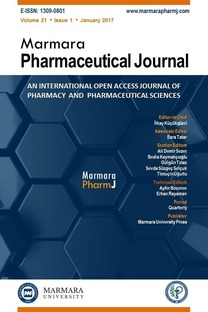Diyabet ve Hipertansiyonda Kullanılan Takviye Edici Gıdalar
Dietary supplements for hypertension and diabetes
___
- Sahoo N, manchikanti P, Dey S. Herbal drugs: standards and regulation. Fitoterapia 2010;81:462-71.
- Vidal-casariego A, Burgos-Peláez r, martínez-Faedo c, calvo-Gracia F, Valero-Zanuy mÁ, luengo-Pérez lm, cuerda-compés c. metabolic effects of l -carnitine on type 2 diabetes mellitus: systematic review and meta-analysis. Exp clin Endocrinol Diabetes 2013; 121: 234–8.
- Johnston GA. Flavonoid nutraceuticals and ıonotropic receptors for the inhibitory neurotransmitter GABA. Neurochem Int 2015; 89:120-5.
- onakpoya IJ, Heneghan cJ. Effect of the novel functional fibre, polyglycoplex (PGX), on body weight and metabolic parameters: A systematic review of randomized clinical trials. clin Nutr 2015; 34:1109-14.
- Friedman m. Anticarcinogenic, cardioprotective, and other health benefits of tomato compounds lycopene, α-tomatine, and tomatidine in pure form and in fresh and processed tomatoes. J Agric Food chem 2013; 61: 9534–50.
- Timmers S, Hesselink mK, Schrauwen P. Therapeutic potential of resveratrol in obesity and type 2 diabetes: new avenues for health benefits? Ann NY Acad Sci 2013; 1290: 83–9.
- Kolahdouz mohammadi r, Hosseinzadeh-Attar mJ, Eshraghian mr, Nakhjavani m, Khorami E, Esteghamati A.The effect of coenzyme Q10 supplementation on metabolic status of type 2 diabetic patients. minerva Gastroenterol Dietol 2013; 59:231–6.
- chrysant SG. The clinical significance and costs of herbs and food supplements used by complementary and alternative medicine for the treatment of cardiovascular diseases and hypertension. J Hum Hypertens 2016; 30:1-6.
- malaguarnera m, Vacante m, motta m, malaguarnera m, li Volti G, Galvano F. Effect of l-carnitine on the size of low-density lipoprotein particles in type 2 diabetes mellitus patients treated with simvastatin. metabolism 2009;58:161823.
- Vashum KP, mcEvoy m, Shi Z, milton AH, Islam mr, Sibbritt D, Patterson A, Byles J, loxton D, Attia J. Is dietary zinc protective for type 2 diabetes? results from the Australian longitudinal study on women’s health. Bmc Endocr Disord 2013;13:40.
- rondanelli m, Faliva mA, Peroni G, moncaglieri F, Infantino V, Naso m, Perna S. Focus on pivotal role of dietary intake (diet and supplement) and blood levels of tocopherols and tocotrienols in obtaining successful aging. Int J mol Sci 2015;16: 23227-249.
- Şahin Ş. Eczane Pratiğinde Diyabete Yaklaşım ve Biliçlendirme. Havan Dergisi-Nisan 2016; 72:38-40.
- rafighi Z, Shiva A, Arab S, mohd Yr. Association of dietary vitamin c and E ıntake and antioxidant enzymes in type 2 Diabetes mellitus patients. Glob J Health Sci 2013;5: 183–7.
- Abdali D, Samson SE, Grover AK. How effective are antioxidant supplements in obesity and diabetes. med Princ Pract 2015; 24;201–15.
- ISSN: 1309-0801
- Yayın Aralığı: Yılda 6 Sayı
- Başlangıç: 1985
- Yayıncı: Marmara Üniversitesi
Synthesis and evaluation of new imidazo[2,1-b]thiazoles as antituberculosis agents
Nuray ULUSOY GÜZELDEMİRCİ, Elif GÜRSOY
Garcinia atroviridis’in fitokimyasal ve farmakolojik özellikleri
Hanisuhana HAMİDON, Muhammad TAHER, Zainul Amiruddin ZAKARİA, Deny SUSANTİ
Diyabet ve Hipertansiyonda Kullanılan Takviye Edici Gıdalar
Gülay KEMERCİ, HATİCE KÜBRA ELÇİOĞLU
Garcinia atroviridis – A review on phytochemicals and pharmacological properties
Hanisuhana HAMİDON, Deny SUSANTİ, Muhammad TAHER, Zainul Amiruddin ZAKARİA
The situation of curriculums of faculty of pharmacies in Turkey
Mehmet Barlas UZUN, GİZEM GÜLPINAR, GÜLBİN ÖZÇELİKAY
Cilt Beyazlatıcılara Genel Bakış
Aprepitantın İnsan Glioblastoma U87MG Hücreleri üzerinde Antiproliferatif ve Apoptotik Etkileri
İnsektisit Aktivite Gösteren Bitkisel Sekonder Metabolitler ve Etki Mekanizması
Çiğdem AYDIN, RAMAZAN MAMMADOV
Türkiye’deki Eczacılık Fakültelerinin Müfredatlarının Değerlendirilmesi
